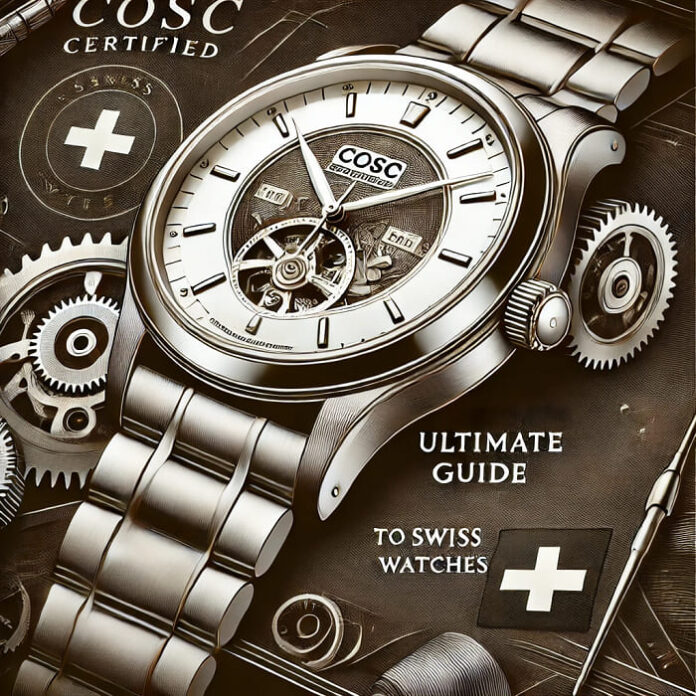COSC Certified Watches: Ultimate Guide to Swiss Precision

In the world of horology, precision and accuracy are paramount. For watch enthusiasts and collectors, the term "COSC certified" often comes up as a mark of excellence. But what exactly does this certification mean, and why is it so important in the watch industry? In this comprehensive guide, we'll explore the world of COSC certified watches, their significance, and what sets them apart from other timepieces.
COSC, which stands for Contrôle Officiel Suisse des Chronomètres (Official Swiss Chronometer Testing Institute), is an independent Swiss organization that certifies the accuracy and precision of watch movements. A watch that has been COSC certified has undergone rigorous testing to ensure it meets strict standards for timekeeping accuracy.
COSC certification is highly regarded in the watch industry as a symbol of quality and precision. It serves as a benchmark for excellence in watchmaking and is often used by luxury watch brands to differentiate their high-end models from more standard offerings.
Quick menu

- The COSC (Contrôle Officiel Suisse des Chronomètres)
- COSC Certification Process
- Criteria for Certification
- The Significance of COSC Certification
- COSC Certified Watches vs. Non-Certified Watches
- Popular COSC Certified Watch Brands
- Types of COSC Certified Watches
- Pricing and Availability
- COSC vs. Other Certifications
- Identifying a COSC Certified Watch
- The Future of COSC Certification
- FAQs
- Conclusion
The COSC (Contrôle Officiel Suisse des Chronomètres)
History and Establishment
The COSC was established in 1973, but its roots can be traced back to the late 19th century when observatory trials were used to test the accuracy of marine chronometers. The need for a standardized testing process led to the creation of the COSC as we know it today.
Role of the Official Swiss Chronometer Testing Institute
The COSC is responsible for testing and certifying the accuracy of watch movements submitted by Swiss watch manufacturers. It operates as an independent, non-profit organization to ensure impartiality in its evaluations.
Relationship with the Swiss Watch Industry
The COSC works closely with the Swiss watch industry, particularly with the Federation of the Swiss Watch Industry (FHS). This collaboration ensures that the certification process evolves with advancements in watchmaking technology while maintaining the high standards that Swiss watches are known for.
COSC Certification Process
Submission of Movements for Testing
Watch manufacturers submit uncased movements to the COSC for testing. These movements are the "engines" of the watch, responsible for its timekeeping functions.
Testing Procedures and Duration
The COSC subjects each movement to a series of tests over a period of 15 days. The movements are tested in five different positions and at three different temperatures to simulate real-world wearing conditions.
Criteria for Certification
To earn COSC certification, a movement must meet seven specific criteria:
- Daily Rate: The average daily rate must be between -4 and +6 seconds per day.
- Mean Variation in Rates: The average variation of rates must not exceed 2 seconds per day.
- Greatest Variation in Rates: The difference between the greatest daily rate and the lowest daily rate must not exceed 5 seconds.
- Difference Between Rates in Horizontal and Vertical Positions: The variation between horizontal and vertical positions must not exceed -6 to +8 seconds.
- Largest Variation in Rates: The largest variation in rates must not exceed 10 seconds per day.
- Thermal Variation: The rate variation per 1°C must be between -0.6 and +0.6 seconds.
- Rate Resumption: The difference between the rate before and after the test series must not exceed ±5 seconds.
| Criterion | Requirement |
|---|---|
| Daily Rate | Between -4 and +6 seconds per day |
| Mean Variation in Rates | Not to exceed 2 seconds per day |
| Greatest Variation in Rates | Not to exceed 5 seconds |
| Difference Between Horizontal and Vertical Positions | Between -6 and +8 seconds |
| Largest Variation in Rates | Not to exceed 10 seconds per day |
| Thermal Variation | Between -0.6 and +0.6 seconds per 1°C |
| Rate Resumption | Not to exceed ±5 seconds |
The Significance of COSC Certification
Guarantee of Precision and Accuracy
A COSC certified watch offers a guarantee of exceptional timekeeping precision. This level of accuracy is particularly impressive for mechanical watches, which rely on intricate systems of gears and springs rather than electronic components.
Mark of Quality in Watchmaking
COSC certification is widely recognized as a mark of superior craftsmanship and quality in the watchmaking world. It demonstrates a manufacturer's commitment to producing high-precision timepieces.
Impact on Watch Value and Prestige
Watches with COSC certification often command higher prices and are considered more prestigious. The certification adds value to a timepiece, both in terms of its performance and its appeal to collectors and enthusiasts.
COSC Certified Watches vs. Non-Certified Watches
Performance Comparison
While non-certified watches can be highly accurate, COSC certified watches are guaranteed to meet strict performance standards. This ensures a level of consistency and reliability that non-certified watches may not match.
Price Differences
COSC certified watches are typically more expensive than their non-certified counterparts. This price difference reflects the additional testing, the guaranteed performance, and often the higher-quality components used in certified watches.
Consumer Perception
Many watch enthusiasts place a high value on COSC certification, viewing it as a mark of excellence. However, it's important to note that there are many excellent non-certified watches as well, and certification is just one factor to consider when choosing a timepiece.
Popular COSC Certified Watch Brands
Luxury Brands
- Rolex: Known for submitting all of their movements for COSC certification.
- Omega: Many models are COSC certified, with some also receiving additional METAS certification.
- Breitling: Has a long history of producing COSC certified chronometers.
- TAG Heuer: Offers several COSC certified models across their collections.
Mid-range Brands
- Longines: Their "Record" collection features COSC certified movements.
- Tissot: Offers COSC certified models in their higher-end lines.
- Mido: Known for offering affordable COSC certified watches.
Other Notable Brands with COSC Certified Models
Brands like IWC, Panerai, Tudor, and Chopard also offer COSC certified watches in their lineups.
COSC Certification by Brand
| Brand | % COSC Certified (approx.) | Representation |
|---|---|---|
| Rolex | 100% | •••••••••• |
| Omega | 80% | •••••••• |
| Breitling | 100% | •••••••••• |
| TAG Heuer | 40% | •••• |
| Longines | 20% | •• |
| Tissot | 10% | • |
| Mido | 15% | •• |
Note: Each • represents approximately 10%. These percentages are approximate and can vary by year and model lineup.
Types of COSC Certified Watches
Mechanical Watches
The majority of COSC certified watches are mechanical, showcasing the pinnacle of traditional watchmaking skill.
Automatic Watches
Many COSC certified watches feature automatic (self-winding) movements, combining convenience with high precision.
Quartz Watches (Rare but Existent)
While less common, some quartz watches do receive COSC certification, meeting even stricter accuracy standards than their mechanical counterparts.
Pricing and Availability
Price Range of COSC Certified Watches
COSC certified watches can range from around $1,000 for entry-level models to hundreds of thousands of dollars for high-end luxury pieces.
Affordable COSC Certified Options
Brands like Mido, Tissot, and Longines offer relatively affordable COSC certified watches, making this level of precision accessible to a wider range of consumers.
Where to Buy COSC Certified Watches
COSC certified watches are available through authorized dealers, brand boutiques, and reputable online retailers. It's important to purchase from trusted sources to ensure authenticity.
COSC vs. Other Certifications
METAS Certification (Omega)
Omega has introduced its own METAS certification, which includes COSC certification but adds additional tests for magnetic resistance and water resistance.
In-house Certifications by Brands
Some brands, like Rolex and Patek Philippe, have developed their own certification processes that exceed COSC standards.
Comparison of Standards and Prestige
While COSC remains the industry standard, some in-house certifications are considered even more prestigious due to their stricter criteria.
| Feature | COSC | METAS (Omega) | Rolex Superlative | Patek Philippe |
|---|---|---|---|---|
| Accuracy | -4/+6 s/d | 0/+5 s/d | -2/+2 s/d | -3/+2 s/d |
| Magnetic Resistance | Not tested | 15,000 gauss | 1,000 gauss | Not specified |
| Water Resistance | Not tested | Tested | Tested | Tested |
| Power Reserve | Not tested | Tested | Tested | Not specified |
| Aesthetics | Not considered | Not considered | Considered | Strict control |
| Whole Watch Tested | No (movement only) | Yes | Yes | Yes |
| Certification Duration | One-time | Renewable | Permanent | Permanent |
Identifying a COSC Certified Watch
COSC Certificate
Each COSC certified watch comes with a certificate detailing its performance during testing.
Markings on the Watch
Many COSC certified watches will have "Chronometer" or "Officially Certified Chronometer" printed on the dial or engraved on the movement.
Verifying Authenticity
The COSC maintains a database of all certified movements, which can be used to verify a watch's certification status.
The Future of COSC Certification
Evolving Standards in the Digital Age
As technology advances, there's ongoing discussion about how chronometer standards might evolve to remain relevant in an era of highly accurate quartz and smart watches.
Challenges and Criticisms
Some critics argue that COSC standards haven't kept pace with improvements in watchmaking technology and that the certification process could be more transparent.
Relevance in the Smartwatch Era
While smartwatches offer unparalleled accuracy through regular synchronization with atomic clocks, COSC certification remains relevant as a mark of mechanical excellence and traditional craftsmanship
FAQs
Are All Swiss Watches COSC Certified?
No, not all Swiss watches are COSC certified. While Switzerland is known for its high-quality watchmaking, COSC certification is an optional process that manufacturers can choose to pursue for their movements.
How Accurate is a COSC Certified Watch?
A COSC certified mechanical watch is guaranteed to keep time within -4 to +6 seconds per day under various conditions. This level of accuracy is impressive for a mechanical timepiece and exceeds the performance of many non-certified watches.
Is COSC Certification Worth the Extra Cost?
For many watch enthusiasts, the guarantee of precision and the prestige associated with COSC certification justify the additional cost. However, the value proposition depends on individual preferences and budget considerations.
Can a Watch Lose Its COSC Certification?
The COSC certification applies to the movement at the time of testing. While the watch itself doesn't "lose" certification, factors like lack of proper maintenance or damage can cause a watch to perform outside of COSC standards over time.
Conclusion
Recap of the Importance of COSC Certification
COSC certification continues to be a respected benchmark in the watch industry, representing a commitment to precision and quality in mechanical watchmaking.
Considerations for Watch Buyers
When considering a COSC certified watch, buyers should weigh factors such as brand reputation, style preferences, and budget alongside the certification itself.
The Enduring Appeal of Precision in Horology
In an age of digital timekeeping, the pursuit of mechanical precision embodied by COSC certification remains a fascinating aspect of horology, appealing to those who appreciate the art and science of traditional watchmaking.